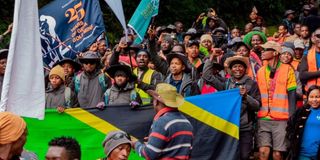Community urged to remian vigilant in fight against HIV/Aids

Moshi. The Kilimanjaro Regional Commissioner, Mr Nurdin Babu, has called on the public—especially young people—to remain vigilant in the fight against HIV/Aids by avoiding risky behaviour and using protection, stressing that the virus still poses a serious public health threat.
Mr Babu issued the reminder during a certificate award ceremony held in honour of participants in the GGML Kili Challenge, a longstanding fundraising and awareness campaign jointly organised by Geita Gold Mining Limited (GGML) and the Tanzania Commission for Aids (TACAIDS).
The climbers, who scaled Mount Kilimanjaro either on foot or by bicycle via the Machame route, were recognised for their contribution to raising awareness about HIV/Aids and generating funds to support community-led interventions.
“HIV/Aids is still a reality. Let’s continue to educate ourselves and others—especially our youth aged 20 to 30—on how to protect themselves and avoid stigma,” said Mr Babu.
GGML’s Acting Managing Director, Mr Ashraf Suryaningrat, reaffirmed the mining firm’s commitment to working closely with the government to achieve the global “Three Zeros” target by 2030: zero new infections, zero discrimination, and zero Aids-related deaths.
“As a responsible investor, GGML supports not just mining operations but broader social development—including healthcare, which is a cornerstone of national progress,” he said.
Mr Suryaningrat commended the climbers, including two 13-year-old orphans, for their courage and selflessness in participating in the physically demanding expedition, describing their efforts as a powerful symbol of patriotism and community spirit.
Mr Simon Shayo, Vice President of Sustainability and Corporate Affairs for Africa at AngloGold Ashanti—the parent company of GGML—noted that this year’s Kili Challenge coincides with the 25th anniversary of GGML’s operations in Tanzania.
He praised the campaign’s consistency over 23 years, saying it has brought together government, corporate, and community stakeholders to make lasting contributions in the fight against HIV/Aids.
“We’re proud to see the Kili Challenge continuing to make an impact year after year. GGML remains committed to supporting this campaign and working with partners to reach our shared goals,” he said.
Kilimanjaro Regional Administrative Secretary, Mr Kiseo Nzowa, revealed that this year’s campaign also included free voluntary HIV testing and education initiatives.
A total of 1,632 people were tested—half of them women—and 54,728 condoms were distributed as part of prevention efforts.
Speaking on behalf of Geita Regional Commissioner Martin Shigela, Mbogwe District Commissioner Ms Sakina Mohamed highlighted GGML’s broader contributions to community development in the mining region. These include projects in water supply, road construction, and support for an orphanage centre in Geita.
As part of the campaign, over Sh130 million was donated to five civil society organisations working in HIV prevention, care, and community support. The donations were made during a colourful ceremony held at Moshi Club in Kilimanjaro.
Among the recipients of the donations were theNetwork for Young People Living with HIV, which receivedSh 29 million; Pata Maendeleo ya Rukwa, awarded Sh 20 million; andKIWAKKUKI (Kilimanjaro Women Against AIDS), which also receivedSh 29 million.
Others includedJali Afya Yako, Epuka MaambukiziandKongwa Arusha DC, each receivingSh 30 millionto support their ongoing efforts in HIV/AIDS prevention and care.
Since its inception 23 years ago, the GGML Kili Challenge has raised hundreds of millions of shillings to support health centres, hospitals, orphanages, and grassroots organisations involved in HIV/AIDS advocacy, treatment, and prevention.
With continued support and collaboration, stakeholders remain optimistic that Tanzania can achieve its HIV/AIDS targets by 2030.





